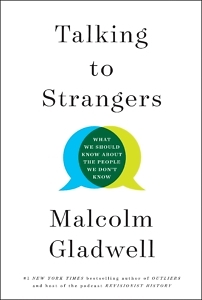Nuanced and Complex and Enigmatic
Malcolm Gladwell reveals our sometimes tragically ineffective strategies for dealing with people we don’t know
“We think we can easily see into the hearts of others based on the flimsiest of clues,” chides Malcolm Gladwell in Talking to Strangers. “We jump at the chance to judge strangers. We would never do that to ourselves, of course. We are nuanced and complex and enigmatic. But the stranger is easy. If I can convince you of one thing in this book, let it be this: Strangers are not easy.”

Gladwell’s inspiration for his first new book in six years is the tragic story of Sandra Bland, the young African American woman whose routine traffic stop in 2015 went so terribly wrong that it led to her suicide three days later in a Texas jail. Hers was one of many cases that brought accusations of police brutality and racial discrimination to the forefront of public consciousness during that time. Unable to make sense of such senseless loss, Gladwell did what he does best: He examined the evidence and began to search for underlying causes. What he discovered is that human beings are prone to misunderstand and misjudge one another based on certain commonly held assumptions — assumptions that may be necessary to maintain a functional society, but that can have devastating consequences in individual situations.
As he considers historical meetings between strangers that ended spectacularly badly (think Cortés and Montezuma or Chamberlain and Hitler), Gladwell is left with two questions: “Why can’t we tell when the stranger in front of us is lying to our face?” and “How is it that meeting a stranger can sometimes make us worse at making sense of that person than not meeting them?” To answer these questions, Gladwell reviews scientific studies and investigations into accused double agents, abusers, frauds, and murderers.
 From psychologist Tim Levine, he learns the key idea that most people “default to truth.” In the absence of overwhelming evidence to the contrary, we generally assume that the person to whom we are speaking is honest. Because liars and con artists are relatively rare, this belief allows us to maintain focus as we move through the day, without questioning the motives of every single person we meet. A University of Chicago study further reveals that a computer program can more successfully predict whether a defendant will commit another crime while out on bail than a judge who meets that defendant face-to-face. This disputes the concept of “transparency,” which suggests that people are who they appear to be — that their outward behavior is a true picture of their inward feelings.
From psychologist Tim Levine, he learns the key idea that most people “default to truth.” In the absence of overwhelming evidence to the contrary, we generally assume that the person to whom we are speaking is honest. Because liars and con artists are relatively rare, this belief allows us to maintain focus as we move through the day, without questioning the motives of every single person we meet. A University of Chicago study further reveals that a computer program can more successfully predict whether a defendant will commit another crime while out on bail than a judge who meets that defendant face-to-face. This disputes the concept of “transparency,” which suggests that people are who they appear to be — that their outward behavior is a true picture of their inward feelings.
A complication related to transparency is “mismatch,” illustrated by the cases of convicted Ponzi-schemer Bernie Madoff and Amanda Knox, the young American woman who was first convicted of murder and then acquitted after spending several years in an Italian prison. Madoff’s convincing masquerade as a brilliant investment advisor with an uncanny ability to anticipate market trends disguised an enterprise built entirely on theft and deception. Knox, a self-described “quirky” misfit, became a victim of the opposite type of mismatch when she did not react to the brutal murder of her roommate in the way the Italian police thought an innocent person should react. Despite a complete lack of physical evidence linking Knox to the crime, investigators admitted to basing their case on her demeanor during interrogation. Gladwell explains that our already shaky powers of stranger analysis almost completely break down in the face of mismatch, whether purposeful or accidental.
Gladwell is a consummate storyteller, and Talking to Strangers is full of fascinating insights into our evolutionary and cultural blind spots and presumptions about those with whom we share the planet. He asserts, “The right way to talk to strangers is with caution and humility. How many of the crises and controversies I have described would have been prevented had we taken those lessons to heart?” It’s too late for Sandra Bland, but if Talking to Strangers can improve the way the rest of us listen to each other — especially during an era in which civil discourse seems increasingly rare — Gladwell’s efforts will not have been wasted.

Tina Chambers has worked as a technical editor at an engineering firm and as an editorial assistant at Peachtree Publishers, where she worked on books by Erskine Caldwell, Will Campbell, and Ferrol Sams, to name a few. She lives in Chattanooga.


